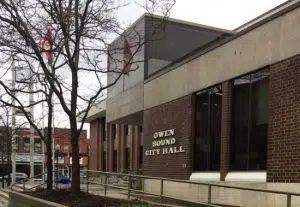
Owen Sound City Hall. (photo by Matt Hermiz/Bayshore Broadcasting)
Owen Sound council will be voting on a recommendation at its meeting Monday to install video surveillance cameras downtown.
Staff are recommending a three-year camera pilot in the River District which would include the installation of up to 17 cameras in two phases. Nine cameras would be installed at various intersections along 8th, 9th and 10th Streets in the first phase.
City manager Tim Simmonds says in a report there was a “call for action from the public” for additional safety and security measures downtown following the death of Sharif Rahman last August. He died from his injuries at the age of 44 after being assaulted by three men outside his restaurant The Curry House on 2nd Avenue East. Police still haven’t announced any arrests in the investigation.
Simmonds acknowledges in his report the growth of video cameras as a security measure in downtown public spaces across North America in recent years has been contentious.
“Supporters argue that video surveillance enhances public safety, aids law enforcement in crime prevention, and provides valuable evidence in investigations. In this view, cameras are necessary to combat criminal activities and ensure the community’s well-being,” Owen Sound’s city manager explains. “Opponents express concern that pervasive surveillance can lead to a surveillance ‘police’ state where individuals are constantly monitored. This can potentially infringe on privacy rights and erode civil liberties.”
The staff recommendation says the cameras won’t have audio capabilities, and will only be located on city-owned property.
“The proposed video surveillance system does not offer real-time monitoring,” Simmonds says. “The video system will capture video footage and store that information in accordance with the city’s Video Surveillance Program Policy.”
Simmonds’ report says the city and Owen Sound Police Service will be working on a memorandum of understanding to operate the camera system. Police would have access to the system, but the city would be responsible for “auditing the access process.”
The three-year downtown cameras pilot will cost $80,000.



